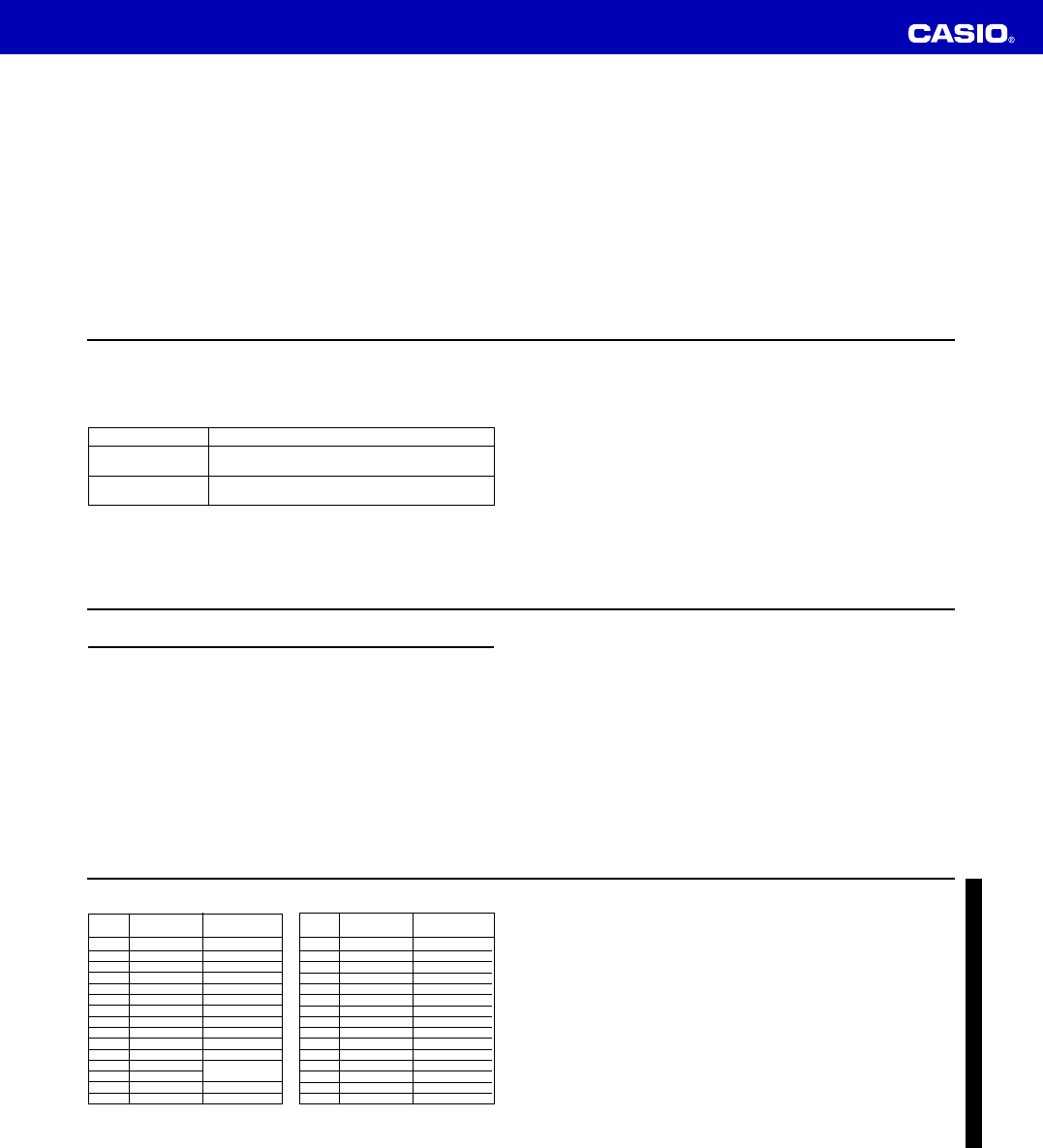
Operation Guide 5178
E-60
Radio-controlled Atomic Timekeeping Precautions
• Strong electrostatic charge can result in the wrong time being set.
•
The time calibration signal bounces off the ionosphere. Because of this, such factors as
changes in the reflectivity of the ionosphere, as well as movement of the ionosphere to
higher altitudes due to seasonal atmospheric changes or the time of day may change
the reception range of the signal and make reception temporarily impossible.
• Even if the time calibration signal is received properly, certain conditions can cause
the time setting to be off by up to one second.
• The current time setting in accordance with the time calibration signal takes priority
over any time settings you make manually.
• The watch is designed to update the date and day of the week automatically for the
period January 1, 2000 to December 31, 2099. Setting of the date by the time
calibration signal will not be performed starting from January 1, 2100.
• This watch can receive signals that differentiate between leap years and non-leap
years.
• If you are in an area where proper time calibration signal reception is impossible, the
watch keeps time with the precision noted in “Specifications”.
E-61
Timekeeping
• The year can be set in the range of 2000 to 2099.
• The watch’s built-in full automatic calendar makes allowances for different month
lengths and leap years. Once you set the date, there normally should be no reason
to change it. Note, however, that if the watch is left uncharged for about one week
after battery power drops to Level 3, the current time and all other settings return to
their initial factory defaults.
• The date will change automatically when the current time reaches midnight. The
date change at the end of the month may take more time than normal.
• The current time for all time zones in the Timekeeping Mode and World Time Mode
is calculated in accordance with the Coordinated Universal Time (UTC) offset of
each zone, based on your Home Time Zone time setting.
• UTC is the world-wide scientific standard of timekeeping. It is based upon carefully
maintained atomic (cesium) clocks that keep time accurately to within microseconds.
Leap seconds are added or subtracted as necessary to keep UTC in sync with the
Earth’s rotation. The reference point for UTC is Greenwich, England.
E-62
Operation
Second hand only is stopped, all other functions are
enabled.
• All functions, including analog timekeeping, disabled
• Internal timekeeping maintained
Elapsed Time in Dark
60 to 70 minutes
(second hand sleep)
6 or 7 days
(function sleep)
Power Saving
Power Saving enters a sleep state automatically whenever the watch is left for a
certain period in an area where it is dark. The table below shows how watch functions
are affected by Power Saving.
• There actually are two sleep state levels: “second hand sleep” and “function sleep”.
• Wearing the watch inside the sleeve of clothing can cause it to enter the sleep state.
• The watch will not enter the sleep state between 6:00 AM and 9:59 PM. If the watch
is already in the sleep state when 6:00 AM arrives, however, it will remain in the
sleep state.
E-63
To recover from the sleep state
Perform any one of the following operations.
• Move the watch to a well-lit area.
• Press any button.
E-64
Specifications
Accuracy at normal temperature: ± 15 seconds a month (with no signal calibration)
Timekeeping: Hour, minutes (hand moves every 10 seconds), seconds, 24-hour, day,
day of the week
Calendar system:Full Auto-calendar pre-programmed from the year 2000 to
2099
Other: Home City code (can be assigned one of 29 city codes and Universal
Coordinated Time); Daylight Saving Time (summer time) / Standard Time
Time Calibration Signal Reception: Auto receive up to six times a day (5 times a
day for the Chinese calibration signal) (Remaining auto receives
cancelled as soon as one is successful); Manual receive
Receivable Time Calibration Signals:
Mainflingen, Germany (Call Sign: DCF77, Frequency: 77.5 kHz); Anthorn,
England (Call Sign: MSF, Frequency: 60.0 kHz); Fukushima, Japan (Call
Sign: JJY, Frequency: 40.0 kHz); Fukuoka/Saga, Japan (Call Sign: JJY,
Frequency: 60.0 kHz); Fort Collins, Colorado, the United States (Call
Sign: WWVB, Frequency: 60.0 kHz); Shangqiu City, Henan Province,
China (Call Sign: BPC, Frequency: 68.5 kHz)
E-65
Stopwatch: Measuring capacity: 23:59'59.95''
Measuring unit: 1/20 second
Measuring mode: Elapsed time, split time
World Time: 29 time zones (29 cities + coordinated universal time)
Other: Standard Time/Daylight Saving Time (summer time); Home City/World
Time City swapping
Other: Power Saving, auto hand home position correction
Power Supply: Solar cell and one rechargeable battery
Approximate battery operating time: 5 months (no exposure to light; one signal
reception of approximately 4 minutes per day)
Pago Pago
Honolulu
Anchorage
Los Angeles
Denver
Chicago
New York
Santiago
Rio De Janeiro
Fernando de Noronha
Praia
London
Paris
Athens
City
City UTC Offset/
Code
GMT Differential
City Code Table
PPG
HNL
ANC
LAX
DEN
CHI
NYC
SCL
RIO
FEN
RAI
UTC
LON
PA R
AT H
–11
–10
–9
–8
–7
–6
–5
–4
–3
–2
–1
0
+1
+2
Jeddah
Te hr an
Dubai
Kabul
Karachi
Delhi
Dhaka
Yangon
Bangkok
Hong Kong
Tokyo
Adelaide
Sydney
Noumea
Wellington
+3
+3.5
+4
+4.5
+5
+5.5
+6
+6.5
+7
+8
+9
+9.5
+10
+11
+12
JED
THR
DXB
KBL
KHI
DEL
DAC
RGN
BKK
HKG
TYO
ADL
SYD
NOU
WLG
City
City UTC Offset/
Code
GMT Differential
L
• Based on data as of December 2010.
• The rules governing global times (UTC offset and GMT differential) and summer
time are determined by each individual country.
L-1









